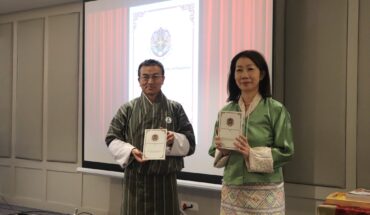
The policy aims to strengthen early learning, ensure developmental readiness, and balance family concerns
TIL BDR Ghalley | Thimphu
The Ministry of Education and Skills Development ( MoESD) has announced a major reform in school admission policy, raising the age of entry for formal schooling to six years from the next academic session.
The move, MoESD said, aligns Bhutan’s education system with international standards and aims to support children’s holistic development before they begin structured learning.
The Department of School Education clarified that this is not a reversal but a reform intended to bring clarity and consistency to the country’s education system.
“The National Education Policy already sets the entry age at six years. International research by OECD, UNESCO, and UNICEF consistently supports six years as the most appropriate age to begin formal primary schooling,” said Director Tashi Namgyal at the 19th meet the press session.
Under the new policy, children aged 5 years and 6 months or above will be admitted for the 2026 transition, ensuring that those already preparing for school are not left behind.
This move was supported as children will turn six during the academic year, maintaining alignment with the new framework.
The Director emphasized that research shows younger children benefit more from play-based, holistic early childhood education rather than structured academics.
“Many countries with strong learning outcomes, such as Finland and Estonia, begin formal schooling at six or seven, emphasising foundational and socio-emotional readiness first,” he said.
However, some parents have expressed concern over the new policy as they are worried about the financial implications of the move.
LB Ghalley, a father from Haa, said, “Sending my child to an early learning centre for a year will be costly. For families like mine, this eats into our hard-earned income.”
Likewise, Poonam, a mother from Thimphu, added, “Not every family can afford pre-primary tuition. I hope the government expands affordable early learning options to ensure no child is left behind.”
Some parents also raised concerns of younger children not enrolled in Early Childhood Care and Development (ECCD) centres.
Pema, a parent from Thimphu, said, “My daughter is 4 years and 8 months old, and she is not enrolled in ECCD. If I do not send her to a centre, she will be left with us at home for nearly two years. It is a long time, and I worry about her development and social interaction.”
Despite these challenges, many parents recognized the developmental benefits.
Tsheltrim, a father from Wangdue, noted, “While it may be inconvenient financially for some, research shows children are better prepared emotionally and cognitively when they start school at six. Early learning is important, but formal schooling too early can create unnecessary stress.”
Teachers also highlighted the advantages of starting school at six.
Ms. Rabika, a primary school teacher in Samtse, said, “Children benefit more from play-based, holistic early childhood education before entering formal school. Structured academics at too young an age can create unnecessary pressure.”
Amrit, a teacher in Tsirang, added, “Starting school at six ensures all children are developmentally ready, both cognitively and socially. This consistency will improve learning outcomes and reduce disparities between younger and older classmates.”
Khandu Wangmo pointed out that the six-year entry policy is most effective in densely populated areas such as Thimphu, where student admissions are high or new enrollments are substantial.
She noted, “Children of staff members are admitted to school as early as age four, while families like ours—less privileged—face greater challenges in accessing early schooling.”
The Ministry stressed that the reform will include expanding ECCD services, including community-based and mobile models, to ensure every child has access to early learning before Grade 1.
“Our goal is to ensure policy consistency, developmental soundness, and alignment with global best practices. Children who are not yet six will have access to quality early learning before they enter formal schooling,” Director Namgyal said.
Research indicates that while younger children may show early academic gains, these advantages often fade in later grades.
A consistent entry age ensures children are developmentally ready and reduces disparities between students.
“Countries like Finland and Estonia, known for high learning outcomes, start formal schooling at six or seven, focusing first on foundational and socio-emotional readiness,” the director added.
To support the 2026 transition, children aged 5 years and 6 months or older will still be admitted. This one-time flexibility ensures that children already preparing for school are not left behind and allows them to turn six during the academic year.
The reform seeks to balance policy consistency, developmental soundness, and equitable access to early learning.
By starting school at six, MoESD hopes to provide a strong foundation for children’s academic, social, and emotional development.
With the Ministry actively expanding ECCD services and providing guidance for families, officials are optimistic that the reform will support every child’s readiness for primary school.





